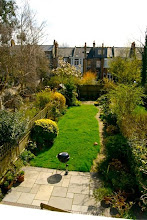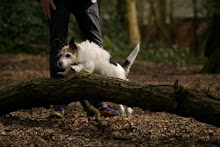




New Year's Day in Aberdeenshire, and the snow is deep on the ground. I've never been to Scotland in winter until now, and it's astonishing for a Londoner like me to see the Highlands at this time of year. Icicles hanging from the rooftops, drifts of snow up to my waist when I tried to go for a walk in the woods (which look like Narnia), and last night, the most eerie moonlight at midnight. It was a full moon on New Year's Eve, and as we peered out into the darkness, it turned out not to be dark at all. At first, I thought perhaps I was seeing the Northern Lights -- for the first time ever -- but it looked more like Moominland, with the snowy peaks of Morven clearly visible in a strange green light. We could see all the way into the distance, beyond Morven, to the far hills that would usually be shrouded in velvety black. In such powerful moonlight, you could imagine werewolves coming down from the mountain, through the trees and into the garden; fortunately, the only creature that made itself heard was a chocolate brown cocker spaniel called Bill, who was snoring gently on his sheepskin rug.
It's snowing again now, but I am warm inside, and about to light a fire and eat some Bendick's Bitter Mints (particularly good on New Year's Day, I think, because they give the illusion of being refreshing.)
Here's a New Year thought from a local minister, who preached in these parts over a century ago, and he in turn provides an appropriate introduction to Lord Byron, who once walked the hills that I now gaze upon, all pristine and covered in snow. Byron wrote the poem in 1807, inspired by crags of Morven, as well as the curves of a female form. It's a bit gloomy in parts (well, Byronic, as to be expected), but less melancholy, I decided, than posting Thomas Hardy's 'The Darkling Thrush', which the poet dated December 31st 1900, striking a memorably bleak note for the new century.
"For the improvement of the human being himself much has been attempted, and it is to be hoped, something accomplished. In the departments of education and sanitation we have seen quite a revolution. Amid all these changes we trust there is one respect in which we have remained unimpaired – in the love of our kindred and love of our country. May the day be distant when the materialism of this cosmopolitan age shall so blunt the sensibilities of the youth reared under the shadow of Morven that wherever they roam their hearts should fail to be warmed by the strains of the youthful Byron, who sang so sweetly: –
Rev. John G. Michie, History of Logie-Coldstone and Braes of Cromar, 1896
When I rov’d a young Highlander o’er the dark heath,
And climb’d thy steep summit, oh Morven of snow!
To gaze on the torrent that thunder’d beneath,
Or the mist of the tempest that gather’d below;
Untutor’d by science, a stranger to fear,
And rude as the rocks, where my infancy grew,
No feeling, save one, to my bosom was dear;
Need I say, my sweet Mary, ’twas centred in you?
Yet it could not be Love, for I knew not the name, –
What passion can dwell in the heart of a child?
But, still, I perceive an emotion the same
As I felt, when a boy, on the crag-cover’d wild:
One image, alone, on my bosom impress’d,
I lov’d my bleak regions, nor panted for new;
And few were my wants, for my wishes were bless’d,
And pure were my thoughts, for my soul was with you.
I arose with the dawn, with my dog as my guide,
From mountain to mountain I bounded along;
I breasted the billows of Dee’s rushing tide,
And heard at a distance the Highlander’s song:
At eve, on my heath-cover’d couch of repose.
No dreams, save of Mary, were spread to my view;
And warm to the skies my devotions arose,
For the first of my prayers was a blessing on you.
I left my bleak home, and my visions are gone;
The mountains are vanish’d, my youth is no more;
As the last of my race, I must wither alone,
And delight but in days, I have witness’d before:
Ah! splendour has rais’d, but embitter’d my lot;
More dear were the scenes which my infancy knew:
Though my hopes may have fail’d, yet they are not forgot,
Though cold is my heart, still it lingers with you.
When I see some dark hill point its crest to the sky,
I think of the rocks that o’ershadow Colbleen;
When I see the soft blue of a love-speaking eye,
I think of those eyes that endear’d the rude scene;
When, haply, some light-waving locks I behold,
That faintly resemble my Mary’s in hue,
I think on the long flowing ringlets of gold,
The locks that were sacred to beauty, and you.
Yet the day may arrive, when the mountains once more
Shall rise to my sight, in their mantles of snow;
But while these soar above me, unchang’d as before,
Will Mary be there to receive me? – ah, no!
Adieu, then, ye hills, where my childhood was bred!
Thou sweet flowing Dee, to thy waters adieu!
No home in the forest shall shelter my head, –
Ah! Mary, what home could be mine, but with you?



















